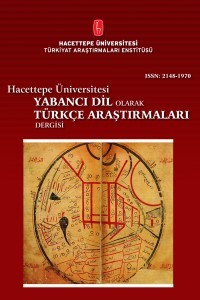TÜRKÇENİN YABANCI DİL OLARAK ÖĞRETİMİNDE ÖĞRETMEN BİLİŞİ VE ÖĞRENCİ İNANIŞLARI
Bu çalışmada öğretmenlerin yetiştirilmesine ve öğretmen bilişine, dil öğrenimi hakkında öğrencilerin inançlarına, bu iki öğe arasındaki ilişkiye dair gönderme yapılarak bu alanda yönerge hazırlanmasına katkıda bulunabilecek sonuçlara ulaşmak ve öneriler sunmak amaçlanmıştır. Böylece öğretmen bilişi hakkında yarı yapılandırılmış mülakat soruları sorulmuş, öğrencilerden ise BALLI’nın Dil Öğrenimi Hakkında İnançlar Envanteri’ni doldurmaları istenmiş, ayrıca mülakat yapılmış, bulgular ayrı ayrı ve toplu halde yorumlanmıştır. Bulgulara göre öğrenciler ve öğretmenler; öğrencilerin motivasyonları, yanlışlarını düzeltme ve başarılı bir dil öğrencisinin özellikleri hakkında benzer inançlara sahipler. Öte yandan öğrenciler ve öğretmenler Türkçenin zorluğu, dilbilgisinin önemi ve öğretilme yöntemi hakkında farklı inançları paylaşmaktadırlar. Öğretmenlerin bilişindeki bulgulardan Türkçe öğretmeye eğitim sürecinin doğal bir sonucu olarak başlamadıkları görülmektedir ve eğitimleri sırasında aldıkları “Yabancılara Türkçe Öğretimi Kursu”nu ise kifayetsiz ve yetersiz uygulama olarak tanımlamaktadırlar. Öğretmenler hedef dil için anadilini konuşur olmanın gerekli, fakat yeterli olmadığına inanmaktadırlar. Ayrıca öğretmenler daha önce yabancı bir dil öğrenirken kazandıkları deneyimlerin öğretmenlik uygulaması üzerinde etkisi olduğunu düşünmekte ve öğretmenlik deneyimlerinin mesleki gelişimleri üzerinde en büyük katkıyı yaptığına inanmaktadırlar
Anahtar Kelimeler:
Türkçenin yabancı dil olarak öğretimi, öğretmen bilişi, öğrenci inanışları, “Dil Öğrenimi Hakkında İnançlar Envanteri”
Teacher Cognition and Student Beliefs in Teaching Turkish as a Foreign Language
In this study it is aimed to reach to results and suggestions which could contribute to the training of teachers and the planning of the instruction in the field by referring to teachers’ cognitions, students’ beliefs about language learning and the interrelation of these two elements. Thus, teachers were asked semi-structured interview questions about teacher cognition, and students were asked to fill in Beliefs About Language Learning Inventory – BALLI and were also interviewed and the results were interpreted separately and jointly. According to the results, students and teachers have similar beliefs about the characteristics of a successful language learner, error correction and motivations of students. On the other hand, students and teachers share different beliefs in terms of the difficulty of Turkish, the importance of grammar and the way it should be taught. From the findings of teachers’ cognitions, it is seen that teachers didn’t start to teach Turkish as a natural outcome of their educational process and they define the course of “Teaching Turkish to Foreigners” that they took during their education as insufficient and lack of practice. Teachers believe that being the native speaker of the target language is necessary but not enough. In addition, teachers think that their own previous foreign language learning experiences have an influence on their teaching practices and they all believe that the biggest contribution to their professional development is their teaching experiences
- ISSN: 2148-1970
- Başlangıç: 2014
- Yayıncı: Hacettepe Üniversitesi
Sayıdaki Diğer Makaleler
YABANCI DİL OLARAK TÜRKÇE ÖĞRETİM KİTAPLARININ KÜLTÜREL İÇERİĞİ
TÜRKÇENİN YABANCI DİL OLARAK ÖĞRETİMİNDE ÖĞRETMEN BİLİŞİ VE ÖĞRENCİ İNANIŞLARI
Erken Çocukluk Döneminde Türkçenin Morfolojik Değişkenliği: İsmin Hâlleri Örneği
BEDEN DİLİNİN YABANCILARA TÜRKÇE ÖĞRETİMİ AÇISINDAN ÖNEMİ
TÜRKÇEYİ YABANCI DİL OLARAK ÖĞRENENLERİN TÜRKİYE’DE KÜLTÜRE VE DİNE AİT ALGILARI
ÜNİVERSİTE PROGRAMLARINDA YABANCI DİL OLARAK TÜRKÇE ÖĞRETMENİ ALAN YETERLİKLERİNİN ARAŞTIRILMASI
Türkçede Kendi Dönüşümlü Zamirinin Analizi
TÜR ODAKLI YABANCI DİL ÖĞRETİMİ VE YABANCI DİL OLARAK TÜRKÇE
